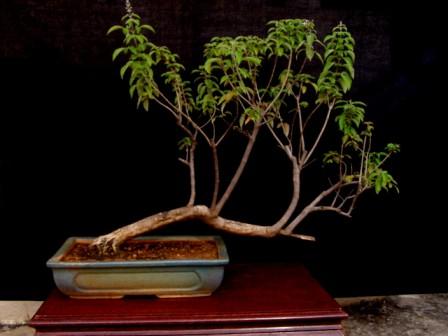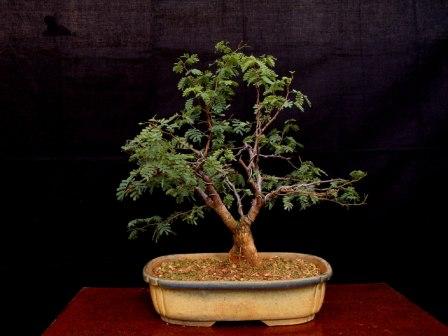Rare species of bonsai
+39
lordy
Neli
Plecostomus
redbeard
giga
DuncanJH
FukienMan
Todd Ellis
Anne
abcd
Weeijk
Cockroach
-Daniel-
milehigh_7
banksia
Kev Bailey
Jim McIntyre
my nellie
craigw
Ryan
Brett Summers
landerloos
sunip
gordonb
Jeff Lahr
bonsaisr
Rob Kempinski
fiona
Arno
kauaibonsai
John Quinn
miguelpc
chappy56
Hombre
Ed van der Reek
moyogijohn
Ian Young
Khaimraj Seepersad
Ravi Kiran
43 posters
Page 5 of 5
Page 5 of 5 •  1, 2, 3, 4, 5
1, 2, 3, 4, 5
 Re: Rare species of bonsai
Re: Rare species of bonsai
This "antique" rose belongs to a fellow club member. He said he dug it from his childhood home and estimates it's age at nearly 50 years. Sorry my photo of it is lacking.
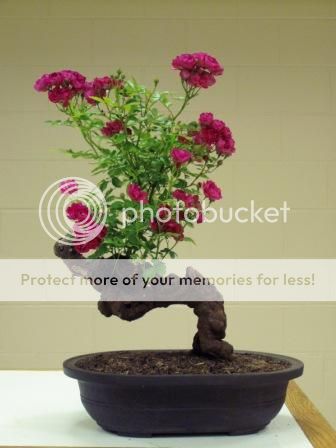


lordy- Member
 Re: Rare species of bonsai
Re: Rare species of bonsai
here's the 9 bark diablo that has just started training-6" base

red mangrove-don't mind why it dosn't look like a bonsai it's going to be going in my reef aquarium as a center piece in my house

black mangrove just starting to recover


red mangrove-don't mind why it dosn't look like a bonsai it's going to be going in my reef aquarium as a center piece in my house

black mangrove just starting to recover


giga- Member
TreeKiller64 likes this post
 Re: Rare species of bonsai
Re: Rare species of bonsai
Ravi Kiran wrote:Hi Jun,
Thanks for starting an inspiring thread. As you have clarified it is a list of trees which are unusual in Bonsai. I don't think that any of them should be endangered either as a species or in the wild. If they are then we perhaps are placing ourselves in an awkward position. Here are two tree from my collection
The first tree is called Buddleja Saligna or Butterfly Bush is its common name. I have not seen anyone use it as a bonsai. When I landed the material it looked very interesting and hence the adventure. As is apparent from the pic the tree has ages to go before being called a proper bonsai. Right now I am waiting for the individual branches to thicken and once that happens I will work on the branch ramification. The styling is what Robert Steven would call an elevated raft style. It is also unusual and unconventional. The tree below...
The second is a species called Prosopis spicigera. In India(atleast in South India) it is called BANNI. It has a lot of religious significance and has a prominent mention in the hindu epic Mahabharatha. This tree again is still under training as a Shohin. The branch ramification has still a long way to go. I would not normally share pics of such unfinished trees but since this thread was about unusual species, I am posting these images. The tree
Regards
Ravi
Hi Ravi,
That first tree is not a saligna. Saligna's, commonly known in South Africa as Wit Olienhout or False Olive, are used widely in the local bonsai scene. The one you have there must be one of the other Buddlejas, but it's difficult to tell from the photo.
Cheers,
Andrew
Andrew Legg- Member
JoesBonsai likes this post
 Rare Species
Rare Species
In the US, members of the genus Prosopis are called mesquite. The native species are found throughout the Southwest, especially in chaparral communities (= Mediterranean maquis). The aromatic wood is prized for barbecuing. Because they are so gnarled & picturesque, Western bonsai growers have been trying to tame mesquite for years, with only sporadic success. They have a very long taproot & do not like being in a pot.Andrew Legg wrote:
The second is a species called Prosopis spicigera. In India(atleast in South India) it is called BANNI. It has a lot of religious significance and has a prominent mention in the hindu epic Mahabharatha. This tree again is still under training as a Shohin.
The Israeli species is P. farcta, also naturalized here. I don't know if Israeli growers use it for bonsai.
Iris
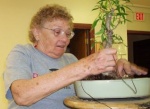
bonsaisr- Member
 Huisache, Sweet Acacai, (Acacia farnesiana)
Huisache, Sweet Acacai, (Acacia farnesiana)
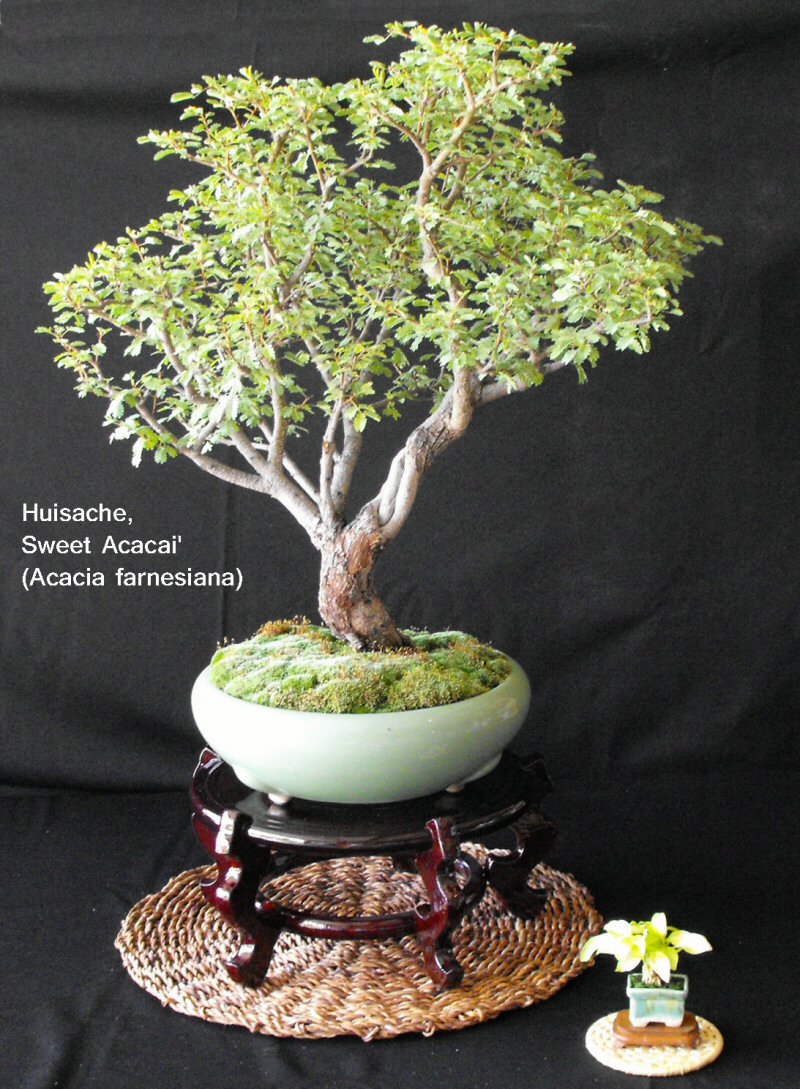
This is a common tree of southwest USA and with the little leaves should be used more often it is hard to keep over winter in the north because it needs more light so it does poorly in a greenhouse.
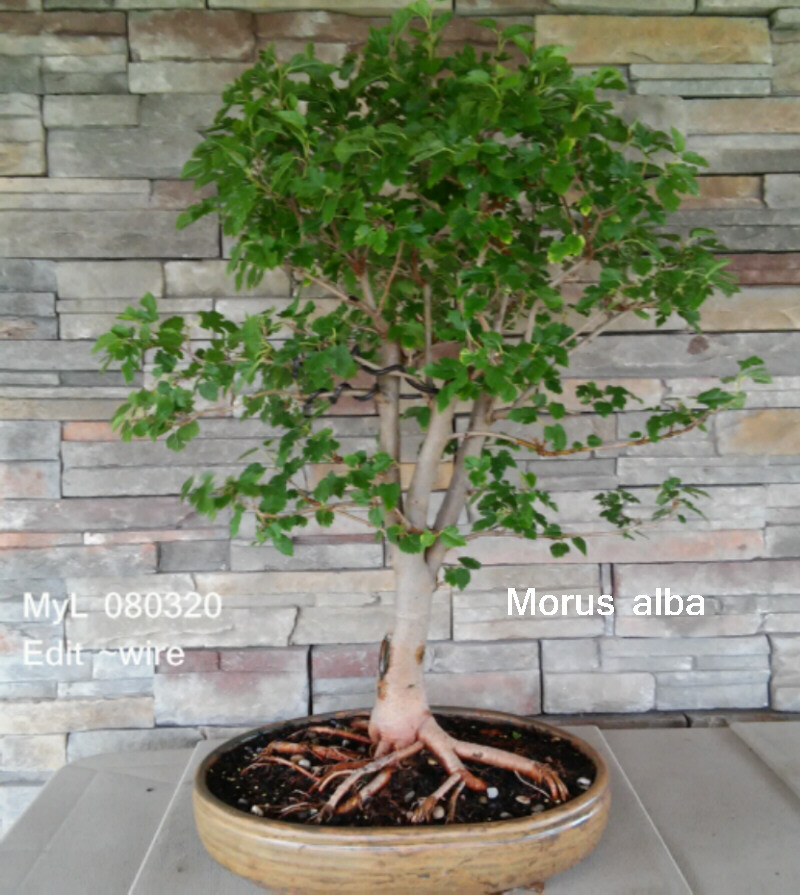
Mulberries are weeds in my area (Detroit) they are usually crosses between the American native rubra and the imported alba, and they go both ways. Crosses tend to be like the pod parent as modified by the pollen donor. The best are white on red, I guess, but all leaves will reduce and the smaller they get, the more frilly the leaves. Easy to transplant, reduce and grow, they appear as weeds brought to you by your feathered friends. They grow fast and will tolerate thin pots, but the one draw-back is a leaf spot that mars the looks of the foliage without hurting tree. I treat with Bayer 2x a year. I've never seen one in bonsai, just a few of the oriental ~dwarfs~ which have never been styled any way but contorted. Not my cup of tea unless done well; hard to do well because most people think contorted can be anything that is ugly, ipso facto anything that is ugly is proudly mislabeled contorted. These should be used more by greenhorns because they are easy and free most places where Mulberries will grow. They are in the same family as Fig, that should tell you all you need to know.
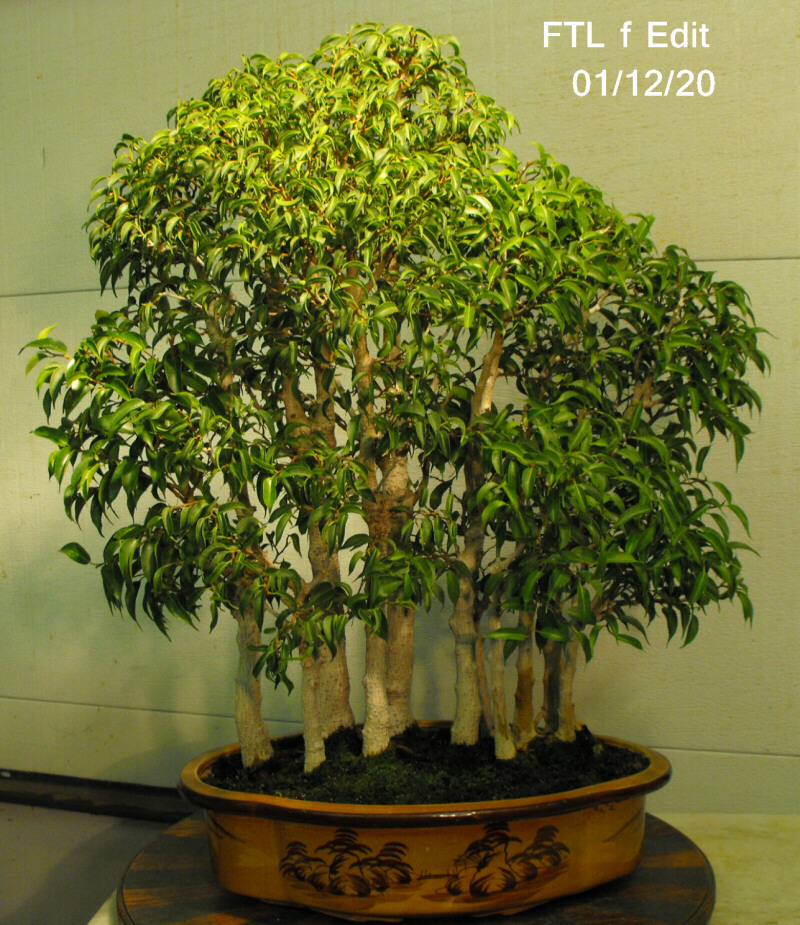
Speaking of Figs, I don't see many "Too Little" as bonsai. They are great for all styles and make good houseplants because they like having damp feet and will keep their leaves all winter if defoliated each summer outside, acclimated to house light conditions for a couple weeks, and soil kept from drying out over winter. This forest was always together and grown from saplings too thin to be pencils starting in 2003 or so. The leaves reduce nicely and thus lend themselves to forests. This should be the most common species/variety in bonsai and all beginners should start with these. They can be grown well as clip & grow and can be tip pruned routinely winter and summer so there's always something that can be tended to, which is good for new people. Figs should not be wired out of season. Wire only when they can go straight into full sun, and setting in a pool of water doesn't hurt.
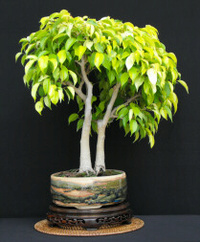
Michigander- Member
 Prosopis chilensis, Argentine or Chilean Mesquite
Prosopis chilensis, Argentine or Chilean Mesquite
These were seeded (from Australia) in 2010. The foliage is kind of non-trainable with fairly long internodes (petioles), so it's been a clip & grow adventure basically forcing more back-budding to get more buds to share the resources. Here, shown from last year it is just starting to be economical enough to look right. Like everything else in bonsai, the longer a bonsai has been intensely worked, the better they look. This year will be better and will be defoliated in June and be show-able in late August. After only 13 years.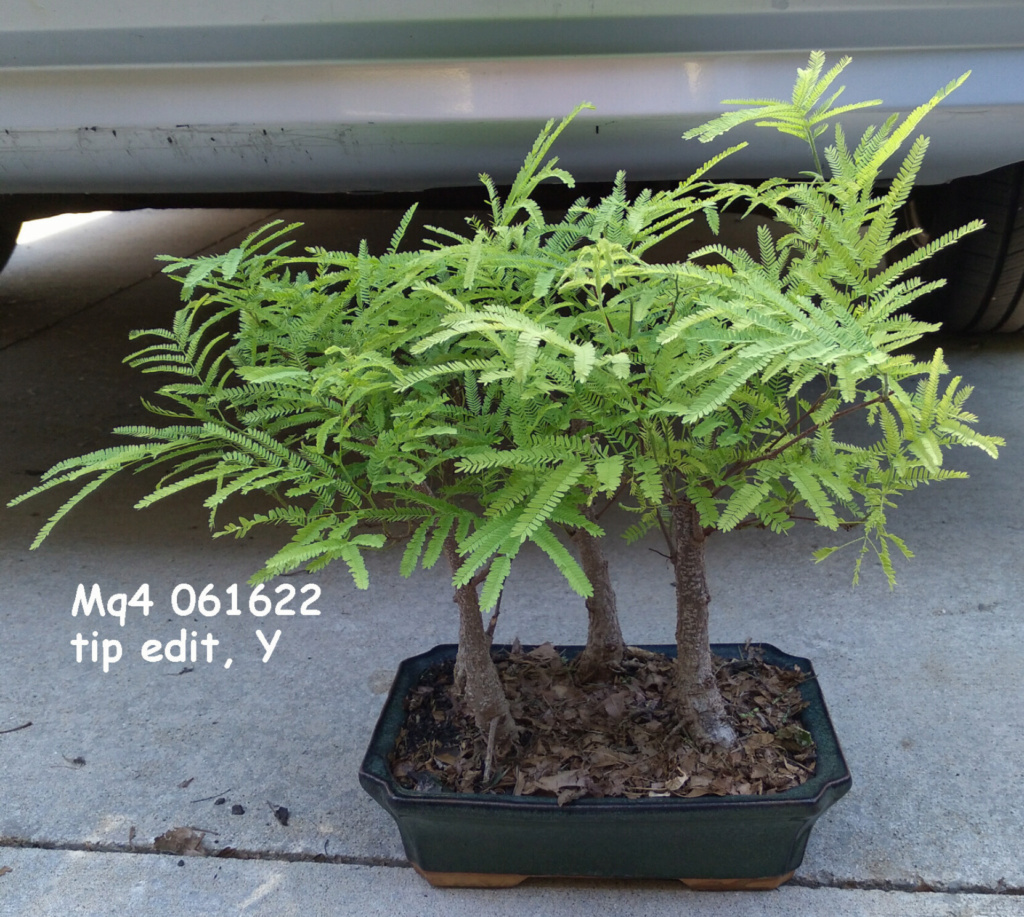


Michigander- Member
 Dwarf Alpine Currant , Ribes alpinum 'Pumilum'
Dwarf Alpine Currant , Ribes alpinum 'Pumilum'
This was a nursery pot plant in 2005. It grows slowly, but that translates into easy to keep in-bounds. Shown here passing out of flower which look great, and better yet it's either not fertile or needs a mate from the Matterhorn, 4,000 miles that-a-way. I've never seen another one which is everyone else's loss. The tiny flowers in clusters are long lasting, the foliage dense, leaves very small, ~3/8" and frilly. As good of a bonsai candidate as any.
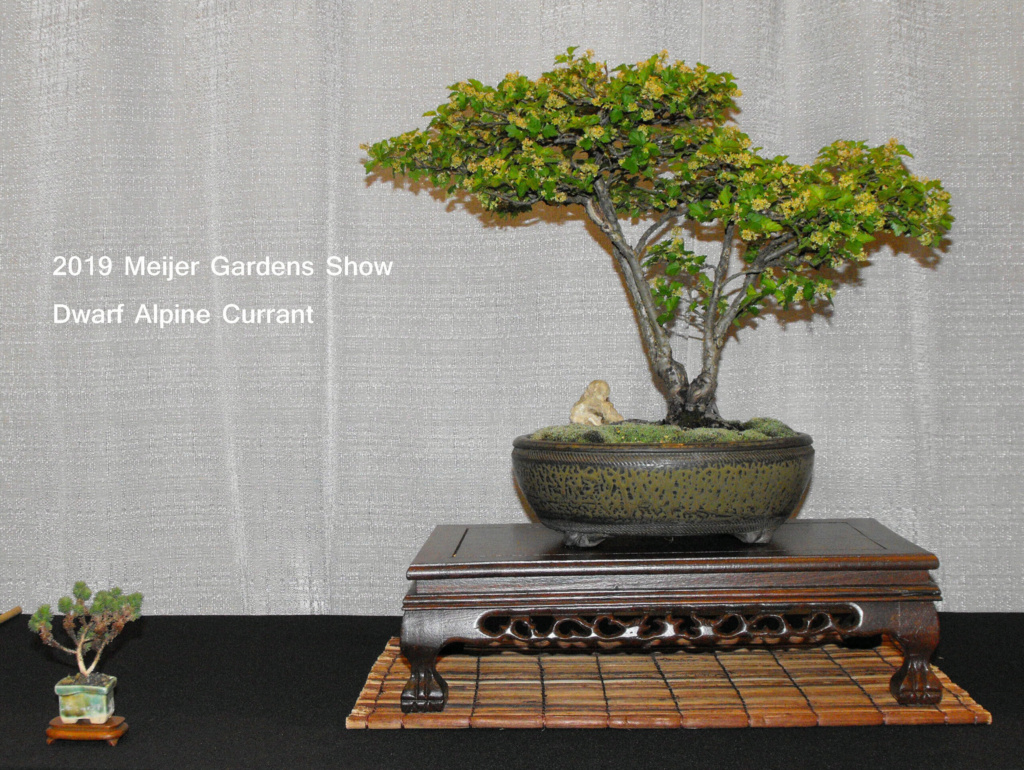


Michigander- Member
 Syringa pubescens subsp. patula 'Miss Kim'
Syringa pubescens subsp. patula 'Miss Kim'
Great species from Korea, locally fairly common in landscapes now so you can collect from Big Box anytime. The range of colors is creamy white thru pink as here. Smaller flower clusters than big sister, but foliage also lots smaller. Pretty good fall color occasionally, too. Trim hard for shape after blooms fade, don't let it mature seeds. In training from nursery plant, 2006.
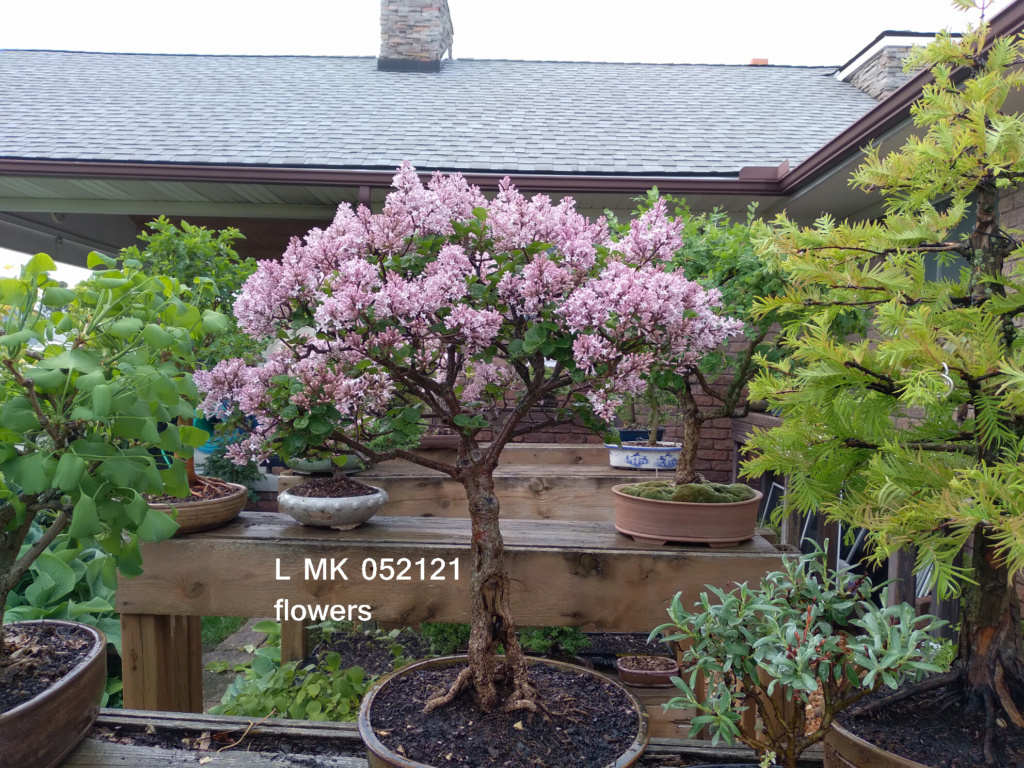
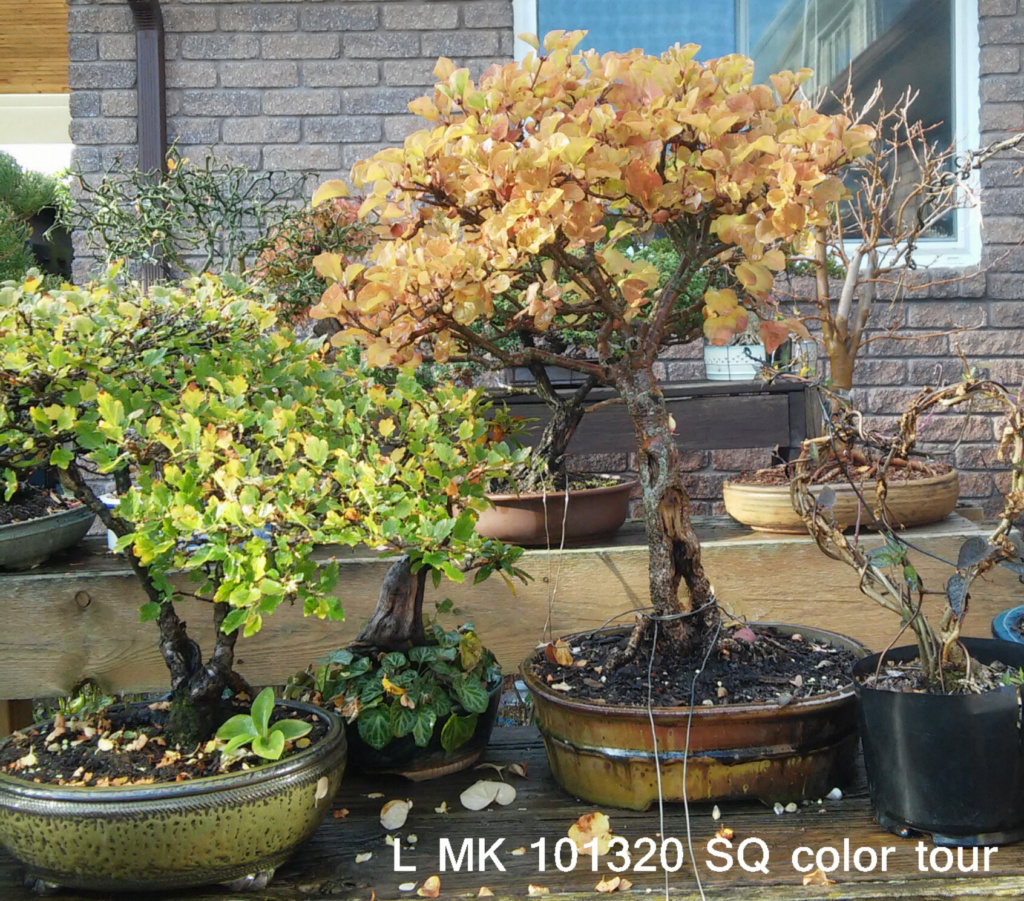



Michigander- Member
TreeKiller64 likes this post
 Siberian Peashrub, Caragana arboresciens
Siberian Peashrub, Caragana arboresciens
Another bullet-proof tree not used much, for no apparent reason. Hardy from USDA zones 2 to 7, those of you living in zone 1 lose out. I like pinnately compound leaves and these are typical pea family, intermediate between Honey and Black locust. Nice little yellow pea flowers, great bark. I love to tell its story. I bought this at a club auction where the lady who owned it gave all her stuff to the club and went to Florida. With her gone, nobody knew what it was, but I like trees with leaves like these and had just coincidently been studying up on hardy candidates for Detroit, and it was on my list. I had never seen one, but instantly recognized it from the descriptions I had read. So, not much bidding opposition and got it for $20 in 2003. 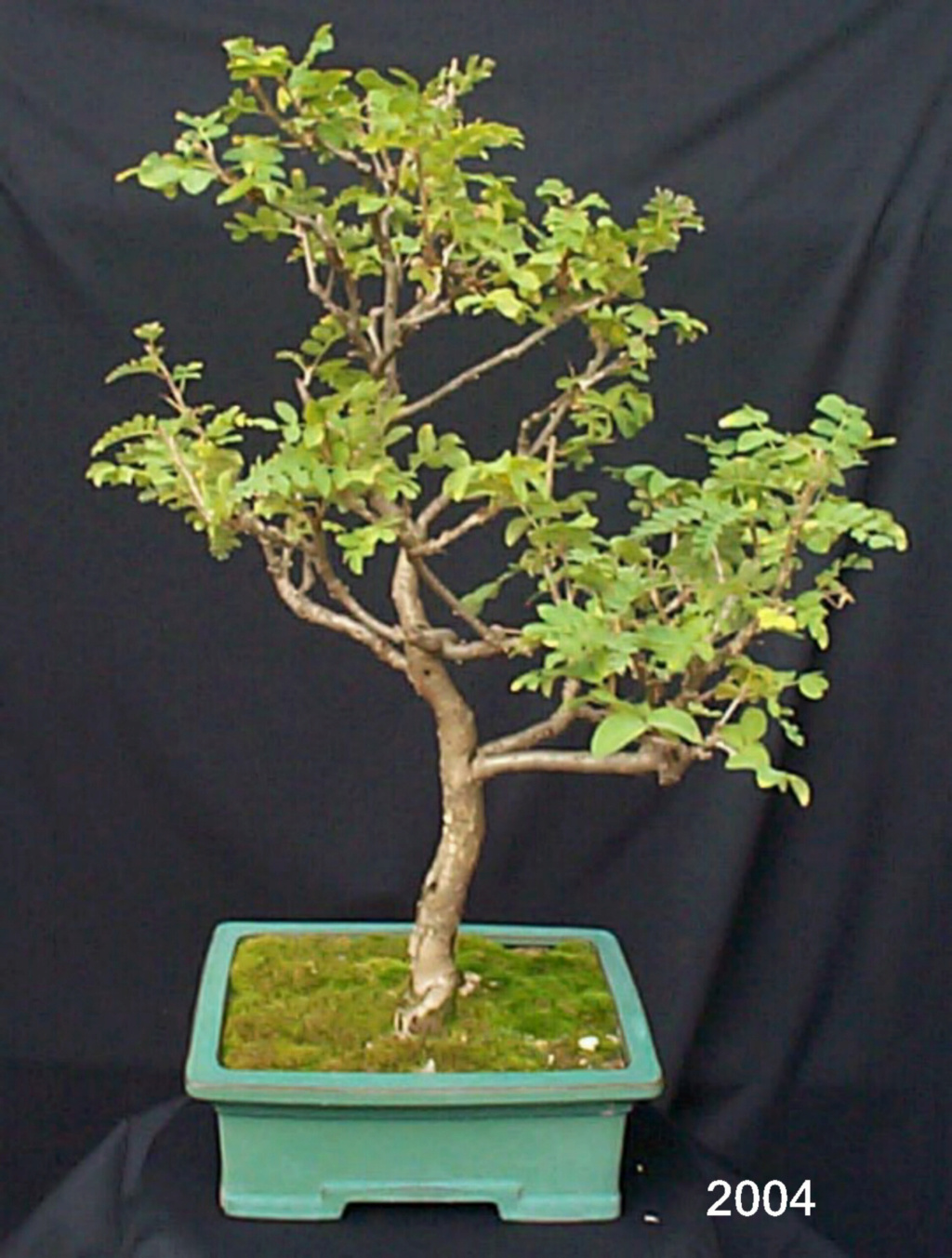
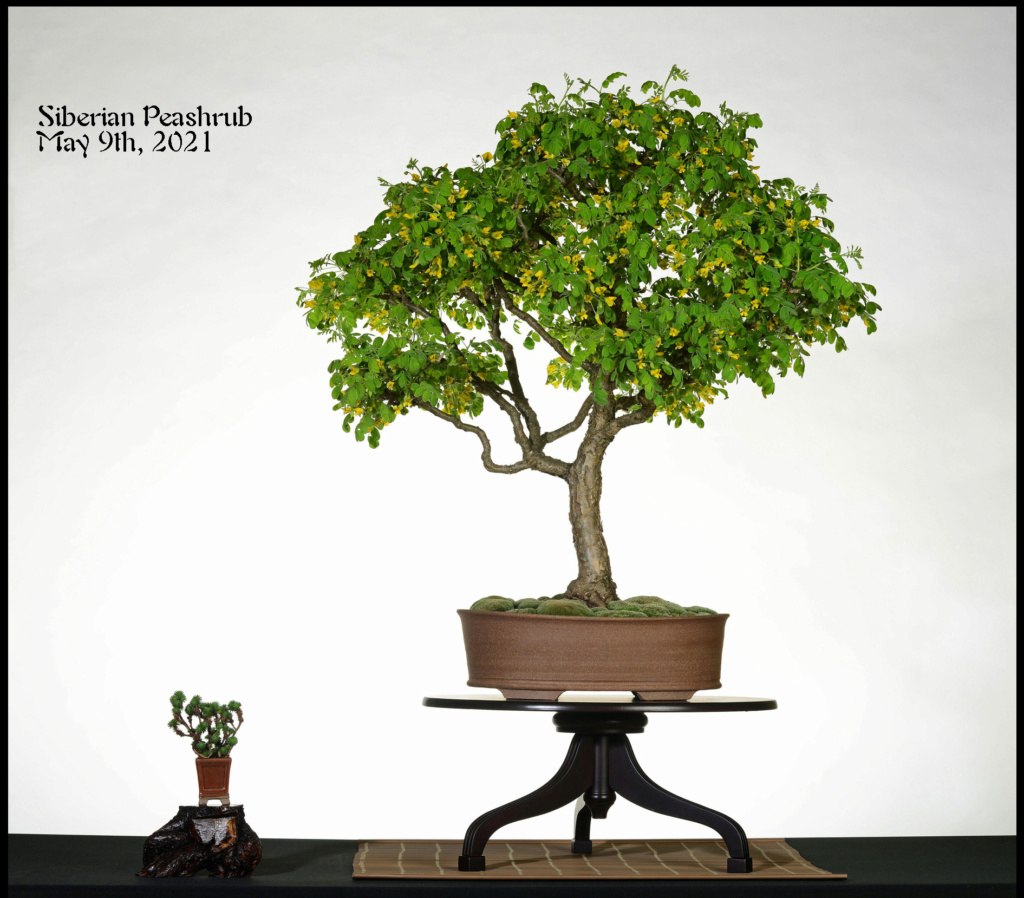
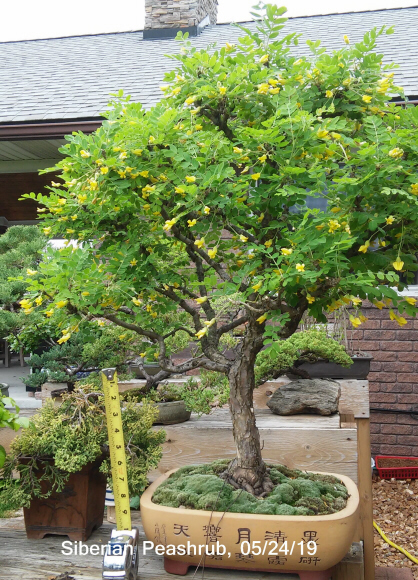




Michigander- Member
TreeKiller64 likes this post
 Dovyalis caffra (Kei Apple)
Dovyalis caffra (Kei Apple)
Aberia caffra is an unknown species for bonsai. One of its merits to be grown for bonsai is that the female tree bears edible fruit. This female tree had 32 fruit.
The juvenile period of seedling-grown plants is 4-5 years, whereas those from cuttings may crop within 2-3 years. Generally, the plants bloom in spring and the fruits ripen from August to October. Fruits mature about 3 months after flowering.
https://www.youtube.com/watch?v=Hp8XT_JZZeU
The juvenile period of seedling-grown plants is 4-5 years, whereas those from cuttings may crop within 2-3 years. Generally, the plants bloom in spring and the fruits ripen from August to October. Fruits mature about 3 months after flowering.
https://www.youtube.com/watch?v=Hp8XT_JZZeU
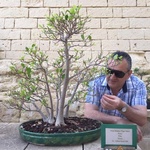
cosmos- Member
TreeKiller64 and Michigander like this post
 Re: Rare species of bonsai
Re: Rare species of bonsai
I've wanted one of these for years, and I finally collected one this spring. A very nasty invasive weed in the US. Rosa multiflora: Multiflora rose. No pics, it's just a root burl with about five trunk-stalks. Should be pretty bullet-proof, as they are hard to eradicate in yards or gardens.
PS: a quick Google search shows me many other examples, so, not all that rare, perhaps.
PS: a quick Google search shows me many other examples, so, not all that rare, perhaps.
Dave Leppo- Member
 Re: Rare species of bonsai
Re: Rare species of bonsai
A picture of your collected one would be nice. I've tried dwarf roses, but they are worse than difficult, wanting to reach for the sky and ramifying almost zero. A long-legged variety like yours is even more vigorous and if you can tame it you can rip the crown from John Naka's head... 

Michigander- Member
Dave Leppo likes this post
Page 5 of 5 •  1, 2, 3, 4, 5
1, 2, 3, 4, 5
 Similar topics
Similar topics» New species bonsai.
» Uncommon Bonsai Species - Texas Sage
» Novice Stratification of 10 different Bonsai species
» Ficus sur - not so common species used in bonsai.
» Rare Fall Color
» Uncommon Bonsai Species - Texas Sage
» Novice Stratification of 10 different Bonsai species
» Ficus sur - not so common species used in bonsai.
» Rare Fall Color
Page 5 of 5
Permissions in this forum:
You cannot reply to topics in this forum|
|
|








